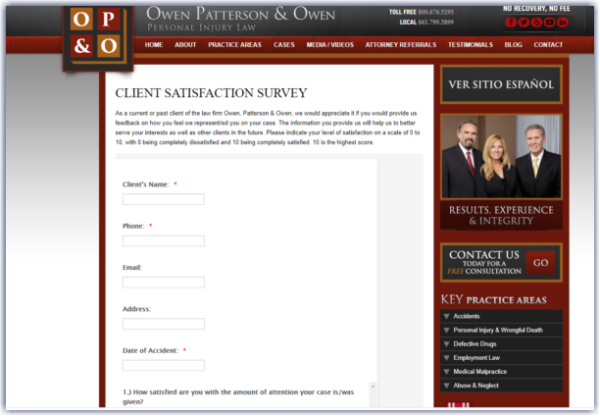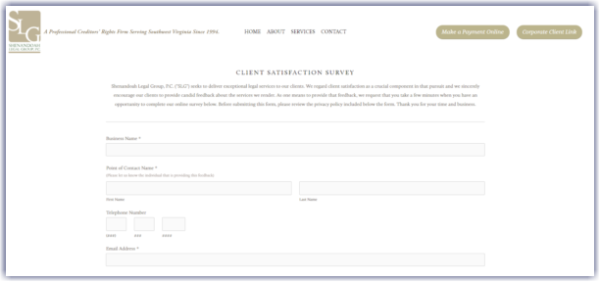
Customer relationship management is a key component of any successful law firm’s marketing strategy. Maintaining a strong relationship with clients is one way to build credibility and generate referrals.
Sending out customer satisfaction surveys is an effective way to keep your brand top of mind for past clients. It’s also a great way to identify your firm’s strengths and any improvements that can be made.
Get new clients and drive referrals with marketing tools and advice for legal professionals.
Why your law firm should use client satisfaction surveys
Sending out client satisfaction surveys to your past clients is a good way to stay in touch with them and maintain brand awareness when they need your services again. A survey can also help you quickly address service failures and client complaints. For service-oriented businesses, how you address a service failure can make the difference between a repeat client and one who posts negative reviews about your firm.
If a dissatisfied client receives your survey and uses it to provide details about their complaint, it can be resolved more easily. You can look through these surveys and contact an unhappy client directly.
Some client complaints are out of your control. Your client might be upset at the amount of a judgment or with a verdict. You are not responsible for these factors, and you might not win back their business. However, if your client says that your attorneys were unavailable or didn’t prioritize their case, then you can address the issue with the client directly and take steps toward fixing the problem.
Client satisfaction surveys can also help you develop your branding strategies and your messaging. You can use the answers to identify how your clients see you. Reading through their answers can help you figure out how you stack up against the competition. Use these responses to find keywords that can be used in your digital marketing.
How to develop your law firm survey
First, you should determine what type of survey you are using. Common survey methods include online, phone surveys, or mail surveys. Since client satisfaction surveys are simple in nature and will not be used for statistical reports, many firms use phone or internet surveys.
Choose your distribution method first, as it will inform the rest of the survey. Offline surveys can be longer but are still generally less than five pages including the cover letter. Online and phone surveys should be shorter. People tend to have a shorter attention span for online questionnaires, so you should add fewer questions and be prepared for shorter answers.
The same principle applies to phone surveys. People don’t want to spend a lot of time talking on the phone, so shorter phone surveys will be more successful.
Pick your survey method based on your clients’ behavior. If you get most of your business from social media and other digital methods, your clients may be more likely to respond to an online survey. If your business comes from phone calls or other offline advertising, consider a phone survey. Digital satisfaction surveys should be emailed to the client directly from their attorney for a more personal touch.
Define your goals
Asking the right questions is key to getting the right information. To do so, you must first establish your goals. What are you trying to determine from the survey? If you want to know parts of your client relationship process that can be improved, then you need to give customers open-ended questions that can be used to get this feedback.
Are you going to focus on one part of your process, or are you trying to get a feel for your process as a whole? Do you want to celebrate client successes in your marketing materials? Having a clear vision of your intent will help you write your questions and determine how to order them.
Generic goals, including “determine customer satisfaction” won’t help you create your survey. Make your goals specific. If you want to evaluate your process, focus on one part of it (such as time spent with the client or quality of legal advice). To determine what your firm does well, ask clients to expand on their answers. Instead of just asking them to rate their experience, follow up with open-ended questions for details.
Regardless of the distribution method, there is a chance that your customers won’t finish the survey, especially if you send it to them digitally. Your most important questions should be at the beginning of the survey.
If your primary goal is to highlight customer successes, ask open-ended questions upfront in which customers can share their success stories. If your goal is to make your attorneys more accessible to clients, ask these questions at the beginning of the survey.
Write your Questions
Once you have determined your method of distribution and solidified your goals for the survey, you can start drafting your questions. It’s common to begin the survey by asking customers to rate their experience on a scale from 1-7 (or any range that you prefer). To get the best feedback, combine a variety of open-ended questions and questions on a scale rather than yes or no questions.
For example, you could ask a client “Were you satisfied with our services?” They will either answer yes or no without expanding on the answer, and you will have no context to explain why they were or weren’t satisfied.
If you ask a person to rate their experience from 1-7, the numbers give you a better impression of whether they were satisfied with their experience and to what degree. If someone answered 5, you can assume that they were satisfied, but that their experience could have been better.
Open-ended questions let you get more detailed feedback. Giving your clients the option of sharing specific examples gives you greater insight into their numerical ratings. Some people don’t answer open-ended questions, but others will go into detail, so you can assess what worked during their case and what didn’t.
10 sample questions:
The following ten questions are examples that can be used in your law firm survey, or to help you generate your own questions.
- Overall, how would you rate your experience?
- What did you like best about our communication with you?
- What would you change about your experience?
- How accessible was your attorney?
- What was your experience with the billing process?
- How would you rate your attorney’s knowledge and professionalism?
- How well did your attorney answer your questions?
- How comfortable did you feel discussing your case with your attorney?
- Rate your attorney’s promptness in returning your calls or emails.
- Would you refer our firm to a friend? Why or why not?
Sample customer satisfaction surveys and templates
The following are additional resources that can be used to start the process of writing your law firm survey.
Owen, Patterson, and Owen
Based in Southern California, this law firm specializes in personal injury law. The firm has included a client satisfaction survey on its website. It’s easy to locate, and it’s always available, so clients can comment on their experience long after their case is over. This survey is short; it has 15 questions and boxes where clients can enter their contact information.
SoGoSurvey
SoGoSurvey is an online survey platform that can be used to create, distribute, and analyze surveys. The company offers a variety of templates on its website, including client satisfaction surveys for law firms. This template is tailored to the legal profession to solicit useful client feedback. If you want a starting point for your survey, check out their template.
Shenandoah Legal Group
This Roanoke, Virginia law firm specializes in professional creditors’ rights and small business law. Like the previous example, the firm has a client satisfaction survey on its website. This one consists of five questions all on a rating scale and then offers a place to write a testimonial.
Legal Aid Association of California
As part of its services to members, the Legal Aid Association of California offers templates and tools, including this template for a client satisfaction survey. This one is designed to be administered in the mail. It is longer than the online options and includes language assuring your clients of their privacy.
Legal Aid of Arkansas
Legal Aid of Arkansas is a nonprofit organization that offers legal services to people in need. It offers a client satisfaction survey as a digital file that can be downloaded from their website and submitted via mail or email. This law firm survey is rather short, featuring a combination of questions asking users to rate the firm and open-ended questions.
This survey is tailored to the clientele, with questions asking users to identify barriers to obtaining legal services. Since the organization’s clients tend to have lower incomes, this survey helps identify barriers to service that can be addressed for current and future clients.
What to avoid in your survey
To prevent receiving useless feedback, be sure to take the following steps when drafting and administering your law firm survey:
Don’t be vague
You can avoid this survey trap if you have thoroughly defined your goals for the survey. Trying to start the process by writing questions can leave you with questions that are too vague. When you have defined your goals for the survey, you can write focused questions that will lead to targeted feedback.
Don’t survey clients too often
In the current business climate, it seems like every interaction with a business is followed by a survey. If you call a customer service number, odds are you’ll be asked to stay on the line and answer a survey. Restaurant receipts can even come with a link to a survey at the bottom that can be redeemed for coupons.
Customers may be feeling survey fatigue, which can make them less likely to fill out your survey. To combat this, limit the frequency of customer surveys. Your best option is to send out your survey when the details are fresh in the client’s mind. You might also send follow-up surveys at regular intervals to past clients.
Use these tools sparingly, or your clients might start avoiding your emails. Posting a client satisfaction survey on your website lets customers answer when they want. The tools used to embed a survey onto your website can be configured to minimize spam responses.
Pay attention to privacy
Attorney-client privilege keeps you from sharing the details of your client’s case. Clients of law firms expect all aspects of their case to be handled with discretion. If you are conducting client satisfaction surveys, protect the information in the survey as carefully as you would any other materials related to the case.
If you plan to collect testimonials and use them for your marketing materials, get permission from the survey respondents before publishing. If you plan on using testimonials to develop case studies, get permission from your clients, and structure it in a way that protects their anonymity.
Analyzing your data
Use your tools
How you analyze the data obtained from law firm surveys depends on how you plan to use it. If you are conducting formal research on a random sample of past clients, then you should use scientific methods for interpreting and analyzing your data.
If you are merely trying to determine patterns in client satisfaction or use your survey to enhance your email marketing materials, you can likely exclude some of the data. Most online survey platforms have tools that let you automatically generate reports with easy-to-read graphics. Use tools like charts and word clouds to quickly determine common answers without reading each survey in detail.
Be objective
Reading client criticism is never easy, but it’s important not to take feedback personally. If a negative review will send you charging into the office of the attorney in question asking them to pack up their desk, you might want someone else to analyze the results.
Being objective also requires you to evaluate all survey data as a whole, rather than simply focusing on what you want to hear. It can be tempting to only acknowledge glowing testimonials and disregard all constructive criticism. But listening to all of the feedback helps you identify weaknesses in your firm and fix them so the process goes more smoothly for the next client.
Take action
Customer feedback is only useful if you actually do something with it. While client surveys let you identify potential customer service issues, they are meaningless unless you plan to apply the information.
For example, if a majority of your law firm survey respondents indicate that attorneys are difficult to contact, implement a company-wide policy that makes expected communication turnaround times clear.
Sharing the results
Always share the results of your client satisfaction surveys with attorneys and other employees in your firm. Be objective in these cases too. Don’t use the survey as a tool for disciplinary action, or attorneys probably won’t send them out after cases. Keep the surveys on hand in order to analyze a larger sample.
Once you have enough completed surveys to notice response patterns, make a presentation that you can share with everyone in the firm noting the strengths and weaknesses of your firm and your customer service processes. Celebrate your strengths and brainstorm ideas together for correcting your weaknesses.
The Takeaway
Customer satisfaction surveys are commonplace in many industries, and they serve as valuable tools for law firms. Your firm can use surveys to stay in touch with past clients and as a tool to quickly identify and manage customer complaints.
Data from your surveys can be used to tailor marketing strategies and to determine your competitive advantage. Used properly, these tools are an essential part of your marketing strategy and a valuable resource for improving your firm.






